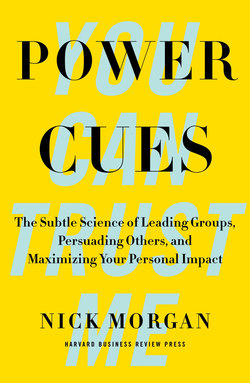Читать книгу Power Cues - Nick Morgan - Страница 16
На сайте Литреса книга снята с продажи.
Let’s Rethink Our Communications
ОглавлениеIt’s time to rethink how we communicate. We now have a much clearer understanding of what people are up to when they commune with one another. Thanks to significant advances in brain science, we can piece together most of what goes on when people attempt to inform, cajole, persuade, amuse, enlighten, control, tease, infuriate, impassion, or lead each other. We don’t have the whole picture with complete certainty, of course, but we now have enough to go on.
We have enough to understand what it takes to get an accurate picture of your own communications profile, to inspire other people, to understand them better, to lead them, to persuade others, to captivate other people with charisma, and to share your vision by becoming a passionate storyteller. These are the specific mysteries of communications I’ll be focusing on in this book. Each of the seven power cues are specifically chosen to help you in these areas.
Before starting, you need to let go of your current ideas about communications. Whether they’ve come from high school debate training, a college course in public speaking, something your mother told you, or just your common sense, most of what you think you know about communications is wrong.
For example, one common misconception is that when giving a speech, you should “tell ’em what you’re going to say, tell ’em, and tell ’em what you said.” Now, there’s nothing wrong with repetition, but the problem is that the world has sped up since that advice first came down the communications grapevine, and we no longer have the patience to listen to something someone tells us three times.
When was the last time you paid attention when someone went through an agenda slide? You didn’t, right? You were on your smartphone checking your email one last time. How about when a speaker says, “In conclusion, what I’ve covered today is …” You were back on the smartphone or packing up your stuff. (Of course, if you’re really Type A, you paid attention only during the opening summary or the ending summary; the rest of the time you were surreptitiously doing email.)
The point is that that sort of bald repetition no longer works because it moves too slowly for us in our attention-deficit-disorder (ADD) world. Repetition has to be artful, disguised, or impassioned like Martin Luther King Jr.’s “I Have a Dream” speech for it to work on our harried minds today.
